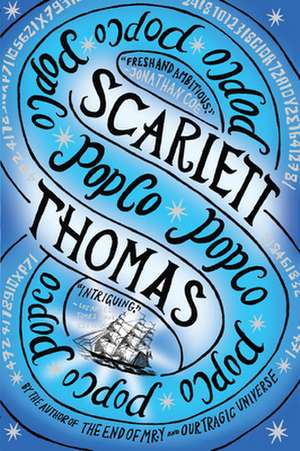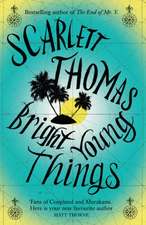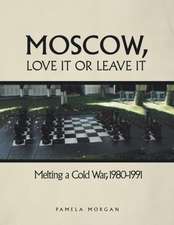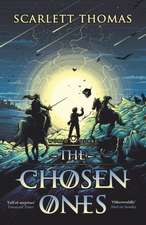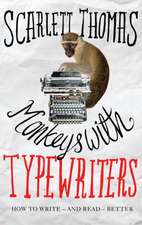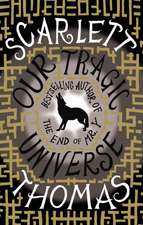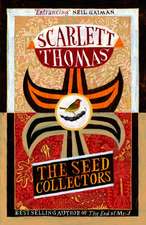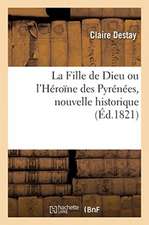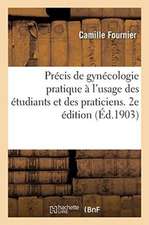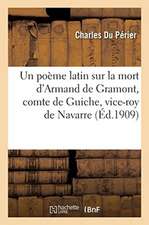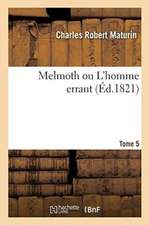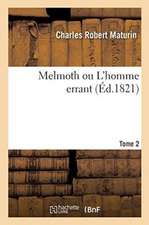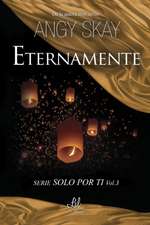PopCo
Autor Scarlett Thomasen Limba Engleză Paperback – 2 oct 2005 – vârsta ani
PopCo tells the story of Alice Butler-a subversively smart girl in our commercial-soaked world who grows from recluse orphan to burgeoning vigilante, buttressed by mystery, codes, math, and the sense her grandparents gave her that she could change the world.
Alice-slight introvert, crossword compositor- works at PopCo, a globally successful and slightly sinister toy company. Lured by their CEO to a Thought Camp out on the moors, PopCo's creatives must invent the ultimate product for teenage girls. Meanwhile, Alice receives bizarre, encrypted messages she suspects relate to her grandfather's decoding of a centuries-old manuscript that many-including her long-disappeared father-believe leads to buried treasure. Its key, she's sure, is engraved on the necklace she's been wearing since she was ten. Using the skills she learned from her grandparents and teaching us aspects of cryptanalysis, Alice discovers the source of these creepy codes. Will this lead her to the mysterious treasure or another, even more carefully guarded secret?
Alice-slight introvert, crossword compositor- works at PopCo, a globally successful and slightly sinister toy company. Lured by their CEO to a Thought Camp out on the moors, PopCo's creatives must invent the ultimate product for teenage girls. Meanwhile, Alice receives bizarre, encrypted messages she suspects relate to her grandfather's decoding of a centuries-old manuscript that many-including her long-disappeared father-believe leads to buried treasure. Its key, she's sure, is engraved on the necklace she's been wearing since she was ten. Using the skills she learned from her grandparents and teaching us aspects of cryptanalysis, Alice discovers the source of these creepy codes. Will this lead her to the mysterious treasure or another, even more carefully guarded secret?
| Toate formatele și edițiile | Preț | Express |
|---|---|---|
| Paperback (2) | 58.52 lei 3-5 săpt. | +13.13 lei 6-12 zile |
| Canongate Books – 21 apr 2016 | 58.52 lei 3-5 săpt. | +13.13 lei 6-12 zile |
| HMH Books – 2 oct 2005 | 98.25 lei 6-8 săpt. |
Preț: 98.25 lei
Nou
Puncte Express: 147
Preț estimativ în valută:
18.80€ • 19.70$ • 15.54£
18.80€ • 19.70$ • 15.54£
Carte tipărită la comandă
Livrare economică 11-25 aprilie
Preluare comenzi: 021 569.72.76
Specificații
ISBN-13: 9780156031370
ISBN-10: 015603137X
Pagini: 512
Dimensiuni: 135 x 203 x 22 mm
Greutate: 0.39 kg
Ediția:First Edition
Editura: HMH Books
Colecția Mariner Books
Locul publicării:United States
ISBN-10: 015603137X
Pagini: 512
Dimensiuni: 135 x 203 x 22 mm
Greutate: 0.39 kg
Ediția:First Edition
Editura: HMH Books
Colecția Mariner Books
Locul publicării:United States
Recenzii
UK PRAISE FOR POPCO
"How many novels can you think of that leave the reader with an intriguing puzzle to solve, plus a cake recipe, plus a crossword and a list of the first thousand prime numbers? Clever, likeable, frothy, zeitgeist-chasing."--Time Out London
"No heroine this year was more beguiling than Alice in Scarlett Thomas's PopCo. A mix of maths, cryptography and vegan politics, this book might just change your life."--Independent on Sunday Novels of the Year.
"How many novels can you think of that leave the reader with an intriguing puzzle to solve, plus a cake recipe, plus a crossword and a list of the first thousand prime numbers? Clever, likeable, frothy, zeitgeist-chasing."--Time Out London
"No heroine this year was more beguiling than Alice in Scarlett Thomas's PopCo. A mix of maths, cryptography and vegan politics, this book might just change your life."--Independent on Sunday Novels of the Year.
Extras
Paddington
Station
feels
like
it
should
be
shut.
Late
at
night,
long
after
rush-hour,
it
has
an
echo
and
the
occasional
blast
of
cold,
thin
air
that
smells
of
diesel.
This
really
is
an
ideal
time
to
be
in
train
stations,
when
hardly
anyone
else
is
travelling.
It
is
almost
half-past
eleven
at
night
and
I
am
looking
for
my
train,
which
is
due
to
leave
in
about
twenty
minutes.
The
station
feels
like
it
is
on
beta-blockers.
A
pulse-yes-but
slowed.
A
medicated
slowness;
a
pleasant
fug.
This
speed,
if
it
were
healthy,
would
belong
to
someone
who
trampolines
every
day,
rather
than
to
the
owner
of
the
more
dangerous
circulation
you
see
clogging
the
station
at
five
or
six
in
the
evening.
For the first time in weeks I am wearing proper shoes, and I can actually hear my footsteps as I walk, a D Major scale playing on concrete. If you ever plan to hang around train stations in the middle of the night, you should always make sure you can hear your own footsteps, and, if you are at all musical, you should try to work out which notes you make as you walk, as it stops you from being lonely, not that I ever get lonely. Tonight I am wearing a long coat and a hat and I almost wish I was smoking an exotic cigarette in a holder because added to the coat, hat and suitcase, it would close the parentheses of this look, which I recognise from films and spy thrillers, but can't actually name, although I know people who could.
I know people who would make all sorts of assumptions about the clothes I am wearing. They would assume I had chosen a "look." They'd see my shirt and jumper and want to say, "School uniform look today, Alice?" but then they'd see my tartan skirt, tights and sensible shoes and eventually conclude that I'm in what has been called in the past my "Bletchley Park" look. Having named my "look," these people would assume that everything was a deliberate part of it, that all my clothes and everything I have with me, from my purse to my suitcase to my knickers, had been chosen for a reason; to identify me, to give me my own code or stamp. Even if I wore-as I have done in the past-a truly random selection of old or weird clothes, this would simply be labelled my "Jumble Sale" or "Homeless" look. I hate this so much. They know I hate it, which is one of the reasons they do it, some logic dictating that when you act annoyed at something people do, it becomes funnier the more they do it.
I work at a toy company called PopCo. Most people love working at PopCo. It's a young, cool company with no dress code, no rules and no set working hours, well, not for the Ideation and Design (ID) staff anyway. Our team, which used to be called Research and Design, but isn't any more, has its own little headquarters in a red-brick building in Battersea and people are just as likely to pull all-nighters making prototypes as they are to suddenly all decamp en masse to Prague for a week, trend-spotting and fact-finding. Ideas are everything, everywhere, everybody at PopCo. We live to attract ideas: we are always in season for them; we fan our tail feathers and dance to attract them; our doors are always open if they decide to finally come over, drunk, when we had given up hope of seeing them that night.
Almost everyone in PopCo Ideation and Design is very cool. They devote themselves to it in a way I find impossible. Perhaps it's because I am a division all on my own, a solitary brand- cluster. I am an island despite being connected to land, a new girl despite having been at the company almost two years, an outsider despite being firmly on the inside. Sometimes, despite being on the run from them and their cool, all that happens is that I find myself at the end or beginning of a circle/cycle when everyone else is in the middle of it. Next year they will be the ones wearing shirts with jumpers and skirts, and their hair in sensible plaits, you can be sure of it. Perhaps at that point I will look like a college kid from Tokyo, as they do now, or like a junked-up space-girl, as they may do the season after next. With the people at PopCo there is a dilemma. If you dress like them, you fit in. If you dress in an opposite way to them, or in things so ridiculous they could never consider wearing them, you are cool, daring and an individual-and therefore you fit in. My constant conundrum: how do you identify yourself as someone who doesn't fit in when everything you could possibly do demarcates you as someone who does? If we were all children, it would be easier to rebel. Then again, if we were children, maybe I would actually want to fit in.
After a reception tomorrow lunchtime, the PopCo Open World event (P.O.W./POW), which is taking place at the company's "Thought Camp" in Devon, will properly begin. PopCo is the third-largest toy company in the world, the first and second being Mattel and Hasbro. It has Corporate Headquarters in Japan and the US, and a smaller version here in the UK. Each country has its own separate ID section, but all the really crazy idea-generation (ideation) goes on at four main Thought Camps around the world, one each in Sweden, Iceland, Spain and the UK. We have all heard of this place in Devon but not many people have been there before. Since we usually have our annual POW somewhere really cool, we have all been wondering why, this year, we are basically going to a PopCo complex in the middle of nowhere. They usually throw money at these events; this year they must be spending next to nothing.
The words "toy company" usually make people think of fluffy things and wooden blocks; elves, perhaps, in an industrial-revolution version of Santa's Grotto, hammering and carving and running around with dolls, farmyard animals and jigsaw puzzles, placing them in sacks for delivery to clean children who sit in front of fires. In fact, these days, toys are more likely to involve fast-food promotions, film tie-ins, interactivity, "added-value," super-branding and, of course, focus groups observed through one-way mirrors. Wooden blocks, at least the ones made by most toy companies, are apparently now designed according to a mathematical formula that tells you how many of each letter to include in which ratios on how many blocks so that children need to own more than one set in order to make proper words. I don't know if this is true but I know the sort of equation that would make it possible. Apparently someone did once suggest we started applying these sorts of equations at PopCo but she was then sacked. I don't know if this is true either. Although it is less than a hundred years old, PopCo has more folklore than some small countries, as well as a bigger GDP. The other major toy companies are the same.
The folklore, like everything else, is part of the fun. Fun colonises everything when you work in a toy company. You may have heard of things like "Geek Cool" and "Ugly Beauty." Nothing is automatically uncool any more, which is another way of saying you can sell anything, if you know how. It isn't immediately clear to some people how this cynical, grown-up world of cool has found its way into the toy market. But those of us who work in the industry know that all marketing is ultimately aimed at children and teenagers. They're the ones with the disposable income and the desire to fit in. They spread crazes like they were nits, and make their parents buy things they don't need. Think of all the current buzzwords going around. A lot of people realise that they "come from" school playgrounds and that what your nine-year-old kid says to his mates this week will be what you and your grown-up colleagues will be saying at work next week. Although these things germinate in playgrounds, they often originate in marketing departments. Kids have an accelerated, intensified idea of "cool." They go through friends, phases, crazes like flowers blooming on speed-cam. You can hit them, successfully, with something like twenty thousand products before they are fifteen, at which point their tastes start to plateau and they buy less.
Toy companies don't necessarily make just toys any more-our most successful division is videogames, and our most financed research is in robotics-we simply make the things that kids want. We are in the business of the new and shiny, the biggest and the best, the glittery and magical, the fast and addictive. The toy industry has two big advantages over other industries. Our products are the easiest to sell, and our customers are the easiest to sell to. That doesn't mean that all products succeed, of course. But we can make things that explode or float or take you to fantasy lands, and, if we get it right, kids' eyes will grow big when they watch our advertisements.
Copyright © Scarlett Thomas 2004
All rights reserved. No part of this publication may be reproduced or transmitted in any form or by any means, electronic or mechanical, including photocopy, recording, or any information storage and retrieval system, without permission in writing from the publisher.
Requests for permission to make copies of any part of the work should be mailed to the following address: Permissions Department, Harcourt, Inc., 6277 Sea Harbor Drive, Orlando, Florida 32887-6777.
For the first time in weeks I am wearing proper shoes, and I can actually hear my footsteps as I walk, a D Major scale playing on concrete. If you ever plan to hang around train stations in the middle of the night, you should always make sure you can hear your own footsteps, and, if you are at all musical, you should try to work out which notes you make as you walk, as it stops you from being lonely, not that I ever get lonely. Tonight I am wearing a long coat and a hat and I almost wish I was smoking an exotic cigarette in a holder because added to the coat, hat and suitcase, it would close the parentheses of this look, which I recognise from films and spy thrillers, but can't actually name, although I know people who could.
I know people who would make all sorts of assumptions about the clothes I am wearing. They would assume I had chosen a "look." They'd see my shirt and jumper and want to say, "School uniform look today, Alice?" but then they'd see my tartan skirt, tights and sensible shoes and eventually conclude that I'm in what has been called in the past my "Bletchley Park" look. Having named my "look," these people would assume that everything was a deliberate part of it, that all my clothes and everything I have with me, from my purse to my suitcase to my knickers, had been chosen for a reason; to identify me, to give me my own code or stamp. Even if I wore-as I have done in the past-a truly random selection of old or weird clothes, this would simply be labelled my "Jumble Sale" or "Homeless" look. I hate this so much. They know I hate it, which is one of the reasons they do it, some logic dictating that when you act annoyed at something people do, it becomes funnier the more they do it.
I work at a toy company called PopCo. Most people love working at PopCo. It's a young, cool company with no dress code, no rules and no set working hours, well, not for the Ideation and Design (ID) staff anyway. Our team, which used to be called Research and Design, but isn't any more, has its own little headquarters in a red-brick building in Battersea and people are just as likely to pull all-nighters making prototypes as they are to suddenly all decamp en masse to Prague for a week, trend-spotting and fact-finding. Ideas are everything, everywhere, everybody at PopCo. We live to attract ideas: we are always in season for them; we fan our tail feathers and dance to attract them; our doors are always open if they decide to finally come over, drunk, when we had given up hope of seeing them that night.
Almost everyone in PopCo Ideation and Design is very cool. They devote themselves to it in a way I find impossible. Perhaps it's because I am a division all on my own, a solitary brand- cluster. I am an island despite being connected to land, a new girl despite having been at the company almost two years, an outsider despite being firmly on the inside. Sometimes, despite being on the run from them and their cool, all that happens is that I find myself at the end or beginning of a circle/cycle when everyone else is in the middle of it. Next year they will be the ones wearing shirts with jumpers and skirts, and their hair in sensible plaits, you can be sure of it. Perhaps at that point I will look like a college kid from Tokyo, as they do now, or like a junked-up space-girl, as they may do the season after next. With the people at PopCo there is a dilemma. If you dress like them, you fit in. If you dress in an opposite way to them, or in things so ridiculous they could never consider wearing them, you are cool, daring and an individual-and therefore you fit in. My constant conundrum: how do you identify yourself as someone who doesn't fit in when everything you could possibly do demarcates you as someone who does? If we were all children, it would be easier to rebel. Then again, if we were children, maybe I would actually want to fit in.
After a reception tomorrow lunchtime, the PopCo Open World event (P.O.W./POW), which is taking place at the company's "Thought Camp" in Devon, will properly begin. PopCo is the third-largest toy company in the world, the first and second being Mattel and Hasbro. It has Corporate Headquarters in Japan and the US, and a smaller version here in the UK. Each country has its own separate ID section, but all the really crazy idea-generation (ideation) goes on at four main Thought Camps around the world, one each in Sweden, Iceland, Spain and the UK. We have all heard of this place in Devon but not many people have been there before. Since we usually have our annual POW somewhere really cool, we have all been wondering why, this year, we are basically going to a PopCo complex in the middle of nowhere. They usually throw money at these events; this year they must be spending next to nothing.
The words "toy company" usually make people think of fluffy things and wooden blocks; elves, perhaps, in an industrial-revolution version of Santa's Grotto, hammering and carving and running around with dolls, farmyard animals and jigsaw puzzles, placing them in sacks for delivery to clean children who sit in front of fires. In fact, these days, toys are more likely to involve fast-food promotions, film tie-ins, interactivity, "added-value," super-branding and, of course, focus groups observed through one-way mirrors. Wooden blocks, at least the ones made by most toy companies, are apparently now designed according to a mathematical formula that tells you how many of each letter to include in which ratios on how many blocks so that children need to own more than one set in order to make proper words. I don't know if this is true but I know the sort of equation that would make it possible. Apparently someone did once suggest we started applying these sorts of equations at PopCo but she was then sacked. I don't know if this is true either. Although it is less than a hundred years old, PopCo has more folklore than some small countries, as well as a bigger GDP. The other major toy companies are the same.
The folklore, like everything else, is part of the fun. Fun colonises everything when you work in a toy company. You may have heard of things like "Geek Cool" and "Ugly Beauty." Nothing is automatically uncool any more, which is another way of saying you can sell anything, if you know how. It isn't immediately clear to some people how this cynical, grown-up world of cool has found its way into the toy market. But those of us who work in the industry know that all marketing is ultimately aimed at children and teenagers. They're the ones with the disposable income and the desire to fit in. They spread crazes like they were nits, and make their parents buy things they don't need. Think of all the current buzzwords going around. A lot of people realise that they "come from" school playgrounds and that what your nine-year-old kid says to his mates this week will be what you and your grown-up colleagues will be saying at work next week. Although these things germinate in playgrounds, they often originate in marketing departments. Kids have an accelerated, intensified idea of "cool." They go through friends, phases, crazes like flowers blooming on speed-cam. You can hit them, successfully, with something like twenty thousand products before they are fifteen, at which point their tastes start to plateau and they buy less.
Toy companies don't necessarily make just toys any more-our most successful division is videogames, and our most financed research is in robotics-we simply make the things that kids want. We are in the business of the new and shiny, the biggest and the best, the glittery and magical, the fast and addictive. The toy industry has two big advantages over other industries. Our products are the easiest to sell, and our customers are the easiest to sell to. That doesn't mean that all products succeed, of course. But we can make things that explode or float or take you to fantasy lands, and, if we get it right, kids' eyes will grow big when they watch our advertisements.
Copyright © Scarlett Thomas 2004
All rights reserved. No part of this publication may be reproduced or transmitted in any form or by any means, electronic or mechanical, including photocopy, recording, or any information storage and retrieval system, without permission in writing from the publisher.
Requests for permission to make copies of any part of the work should be mailed to the following address: Permissions Department, Harcourt, Inc., 6277 Sea Harbor Drive, Orlando, Florida 32887-6777.
Descriere
PopCo tells the story of Alice Butler-a subversively smart girl in our commercial-soaked world who grows from recluse orphan to burgeoning vigilante, buttressed by mystery, codes, math, and the sense her grandparents gave her that she could change the world.
Alice-slight introvert, crossword compositor- works at PopCo, a globally successful and slightly sinister toy company. Lured by their CEO to a Thought Camp out on the moors, PopCo's creatives must invent the ultimate product for teenage girls. Meanwhile, Alice receives bizarre, encrypted messages she suspects relate to her grandfather's decoding of a centuries-old manuscript that many-including her long-disappeared father-believe leads to buried treasure. Its key, she's sure, is engraved on the necklace she's been wearing since she was ten. Using the skills she learned from her grandparents and teaching us aspects of cryptanalysis, Alice discovers the source of these creepy codes. Will this lead her to the mysterious treasure or another, even more carefully guarded secret?
Alice-slight introvert, crossword compositor- works at PopCo, a globally successful and slightly sinister toy company. Lured by their CEO to a Thought Camp out on the moors, PopCo's creatives must invent the ultimate product for teenage girls. Meanwhile, Alice receives bizarre, encrypted messages she suspects relate to her grandfather's decoding of a centuries-old manuscript that many-including her long-disappeared father-believe leads to buried treasure. Its key, she's sure, is engraved on the necklace she's been wearing since she was ten. Using the skills she learned from her grandparents and teaching us aspects of cryptanalysis, Alice discovers the source of these creepy codes. Will this lead her to the mysterious treasure or another, even more carefully guarded secret?
Notă biografică
SCARLETT THOMAS is the author of PopCo and The End of Mr. Y. She has been nominated for the Orange Prize and named Writer of the Year by Elle UK, one of the twenty best young writers by the Independent, and one of the Telegraph's 20 best writers under 40.
